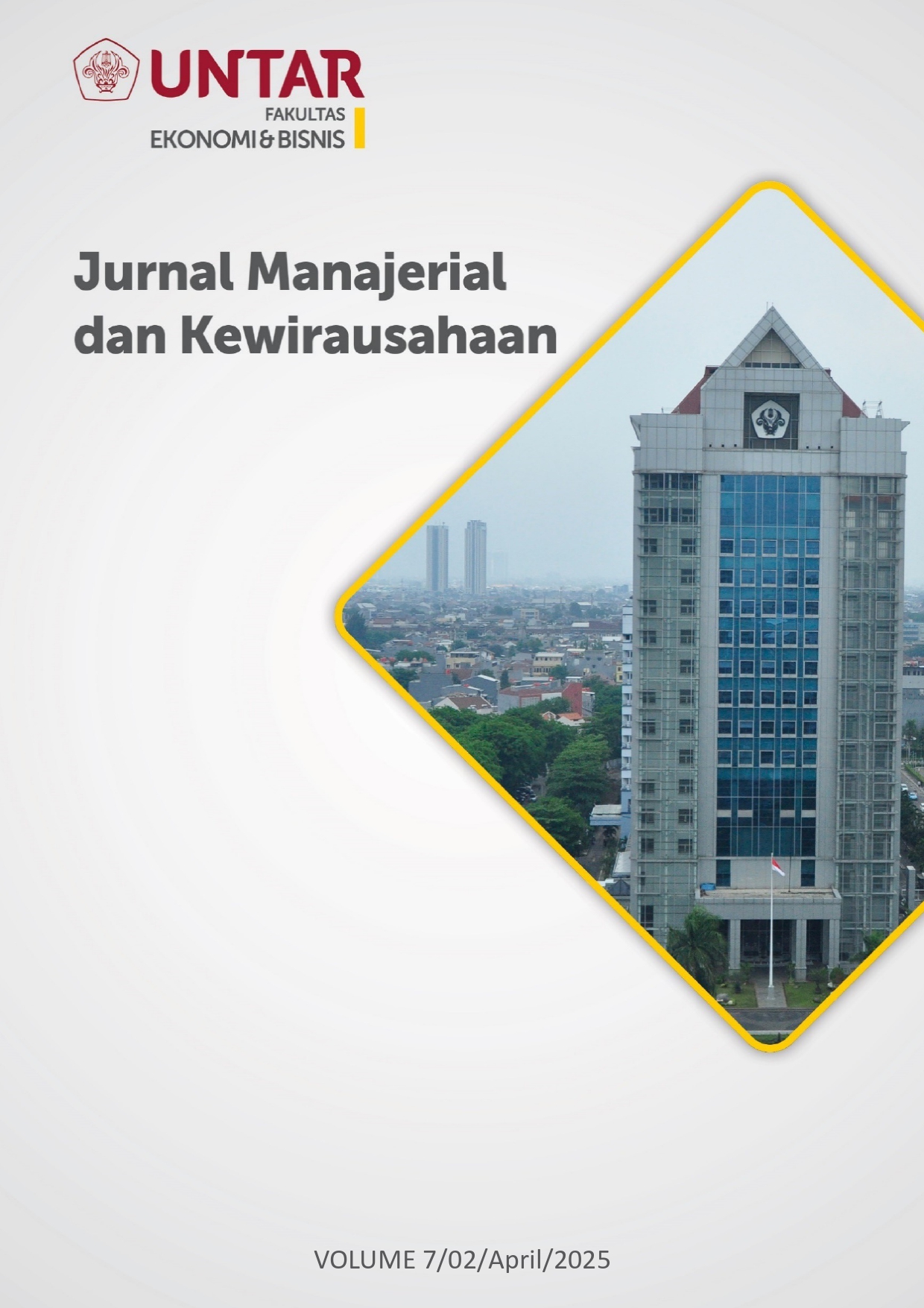Peran Kebudayaan terhadap Inklusi Keuangan: Literasi Keuangan sebagai Variabel Mediasi
Main Article Content
Abstract
Financial inclusion plays a crucial role in sustainable economic development; however, financial exclusion remains a significant challenge, especially among the poor and those in remote areas. Therefore, research on financial inclusion is becoming increasingly important for academics and policymakers. Previous studies have explored the impact of Hofstede’s cultural dimensions on financial inclusion, but significant differences in results exist. This study re-examines the relationship between culture, financial literacy, and financial inclusion, with financial literacy as a mediating variable, using the latest financial data from 35 OECD member countries and their partners in 2022. The 2SLS method shows that individualism positively influences both financial inclusion and financial literacy, while uncertainty avoidance negatively affects financial literacy and financial inclusion, though it is not significant for financial inclusion. Financial literacy is found to mediate the relationship between financial inclusion and individualism. These findings provide valuable insights for policymakers in promoting sustainable financial inclusion, particularly for OECD countries and their partners.
Article Details
Section

This work is licensed under a Creative Commons Attribution-NonCommercial-ShareAlike 4.0 International License.
This work is licensed under a Jurnal Muara Ilmu Ekonomi dan Bisnis Creative Commons Attribution-ShareAlike 4.0 International License.,/p>
References
Ahunov, M., & Van Hove, L. (2020). National culture and financial literacy: international evidence. Applied Economics, 52(21), 2261–2279. https://doi.org/10.1080/00036846.2019.1688241
Chen, W., & Yuan, X. (2021). Financial inclusion in China: an overview. Frontiers of Business Research in China, 15(1), 1-21. https://doi.org/10.1186/s11782-021-00098-6
Demirguc-Kunt, A., Klapper, L., Singer, D., Ansar, S., & Hess, J. (2018). The global findex database 2017: measuring financial inclusion and the fintech revolution. World Bank.
Erlando, A., Riyanto, F. D., & Masakazu, S. (2020). Financial inclusion, economic growth, and poverty alleviation: Evidence from eastern Indonesia. Heliyon, 6(10), e05235. https://doi.org/10.1016/j.heliyon.2020.e05235
Grohmann, A., Klühs, T., & Menkhoff, L. (2018). Does financial literacy improve financial inclusion? Cross country evidence. World Development, 111, 84–96. https://doi.org/10.1016/j.worlddev.2018.06.020
Kamran, S., & Uusitalo, O. (2016). How the unbanked cope with financial exclusion: Evidence from Pakistan. Journal of Financial Services Marketing, 21(2), 153–165. https://doi.org/10.1057/fsm.2016.6
Khan, F., Siddiqui, M. A., & Imtiaz, S. (2022). Role of financial literacy in achieving financial inclusion: A review, synthesis and research agenda. Cogent Business & Management, 9(1), 2034236. https://doi.org/10.1080/23311975.2022.2034236
Komala, M. D., & Widodo, W. (2022). The Nexus between Financial Inclusion and Monetary Policy: The Case Study of Selected ASEAN Countries. Journal of Economics, Business, & Accountancy Ventura, 25(1), 123–134. https://doi.org/10.14414/jebav.v25i1.2920
Le, T. T., Dang, N. D. L., Nguyen, T. D. T., Vu, T. S., & Tran, M. D. (2019). Determinants of Financial Inclusion: Comparative Study of Asian Countries. Asian Economic and Financial Review, 9(10), 1107–1123. https://doi.org/10.18488/journal.aefr.2019.910.1107.1123
Liaqat, I., Gao, Y., Rehman, F. U., Lakner, Z., & Oláh, J. (2022). National Culture and Financial Inclusion: Evidence from Belt and Road Economies. Sustainability, 14(6), 3405. https://doi.org/10.3390/su14063405
Loukoianova, E., Yang, Y., Guo, S., Hunter, L., Jahan, S., Jamaludin, F., & Schauer, J. (2018). Financial Inclusion in Asia-Pacific. Departmental Papers / Policy Papers, 18(17), 1. https://doi.org/10.5089/9781484371015.087
Lu, W., Niu, G., & Zhou, Y. (2021). Individualism and financial inclusion. Journal of Economic Behavior & Organization, 183, 268–288. https://doi.org/10.1016/j.jebo.2021.01.008
Markus, H. R., & Kitayama, S. (1991). Culture and the self: Implications for cognition, emotion, and motivation. Psychological Review, 98(2), 224–253. https://doi.org/10.1037/0033-295X.98.2.224
Ngo A. L. (2019). Index of Financial Inclusion and the Determinants: An Investigation in Asia. Asian Economic and Financial Review, 9(12), 1368–1382. https://doi.org/10.18488/journal.aefr.2019.912.1368.1382
Nguyen, Y. H. D., & Ha, D. T. T. (2021). The Effect of Institutional Quality on Financial Inclusion in ASEAN Countries. The Journal of Asian Finance, Economics and Business, 8(8), 421–431. https://doi.org/10.13106/JAFEB.2021.VOL8.NO8.0421
Nizam, R., Karim, Z. A., Rahman, A. A., & Sarmidi, T. (2020). Financial inclusiveness and economic growth: New evidence using a threshold regression analysis. Economic Research, 33(1), 1465–1484. https://doi.org/10.1080/1331677X.2020.1748508
OECD/INFE 2023. International Survey of Adult Financial Literacy (OECD Business and Finance Policy Papers No. 39; OECD Business and Finance Policy Papers, Vol. 39). (2023). https://doi.org/10.1787/56003a32-en
OJK. (2016). POJK Nomor 76/POJK.07/2016 tentang Peningkatan Literasi dan Inklusi Keuangan di Sektor Jasa Keuangan Bagi Konsumen dan/atau masyarakat.
Ong, V., & Nuyasman, M. N. (2022). Pengaruh Persepsi risiko, persepsi kemudahan, dan literasi keuangan terhadap minat penggunaan Linkaja. Jurnal Manajerial dan Kewirausahaan, 4(2), 516-524. https://doi.org/10.24912/jmk.v4i2.18259
Putri, V. Y., & Nurhayati, I. (2023). Does Financial Inclusion Improve Financial Literacy? An ASEAN Cross-Country Analysis. Dalam Proceedings of the International Conference on Vocational Education Applied Science and Technology (ICVEAST 2023) (Vol. 783, pp. 909–917). https://doi.org/10.2991/978-2-38476-132-6_77
Raji, A. A. H., Alabdoon, A. H. F., Shaker, A. S., & Almagtome, A. (2024). The Effect of National Cultural Values on the Financial Inclusion: An International Perspective. Futurity Economics&Law, 65–82. https://doi.org/10.57125/FEL.2024.06.25.04
Ratnawati, K. (2020). The Impact of Financial Inclusion on Economic Growth, Poverty, Income Inequality, and Financial Stability in Asia. The Journal of Asian Finance, Economics and Business, 7(10), 73–85. https://doi.org/10.13106/JAFEB.2020.VOL7.NO10.073
Sarma, M. (2015). Measuring financial inclusion. Economics Bulletin, Volume 35(Issue 1), 604–611.
Sharif, A., Mehmood, U., Tariq, S., & Haq, Z. U. (2023). The role of financial inclusion and globalization toward a sustainable economy in ASEAN countries: Evidence from advance panel estimations. Environment, Development and Sustainability, 26(4), 10243–10260. https://doi.org/10.1007/s10668-023-03145-9
Singer, D., Demirguc-Kunt, A., Klapper, L., & Singer, D. (2017). Financial Inclusion and Inclusive Growth: A Review of Recent Empirical Evidence. World Bank, Washington, DC. https://doi.org/10.1596/1813-9450-8040
Solomon, A., & Steyn, R. (2017). Cultural intelligence: Concepts and definition statements. South African Journal of Business Management, 48(2), 67–74. https://doi.org/10.4102/sajbm.v48i2.29
Sun, Y., Xu, Y., Zeng, X., Xiao, L., Xia, Q., Zhao, Y., & Wan, X. (2023). Regional Culture and Digital Financial Inclusion in China: Journal of Organizational and End User Computing, 35(2), 1–20. https://doi.org/10.4018/JOEUC.332245
Tanada, N., & Setyawan, I. R. (2020) Penentu perilaku keuangan karyawan muda Jakarta dengan literasi keuangan sebagai variabel mediasi. Jurnal Manajerial dan Kewirausahaan, 2(2), 344-350. https://doi.org/10.24912/jmk.v2i2.7927

